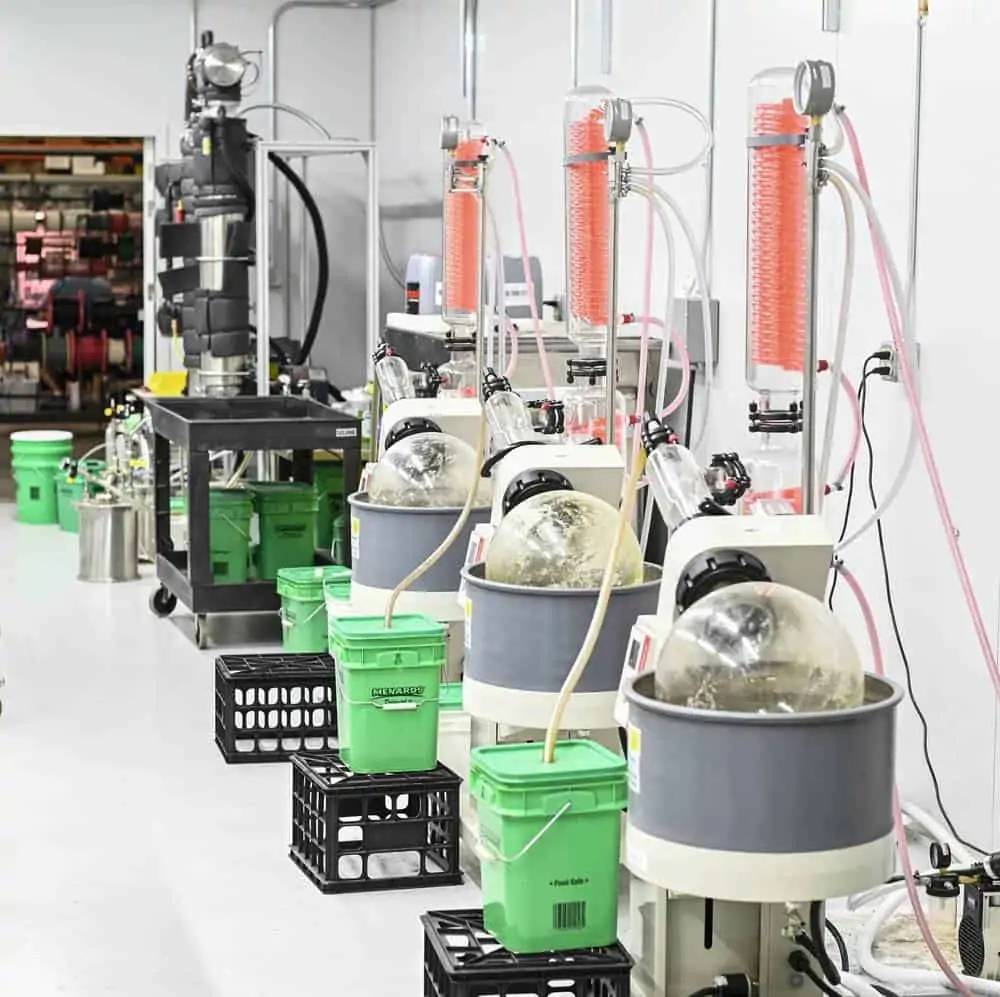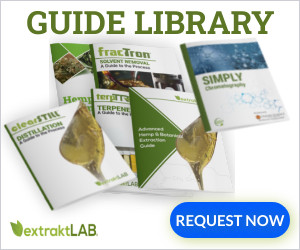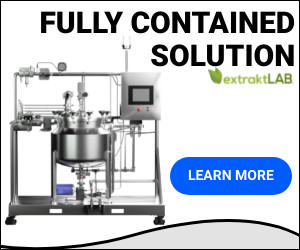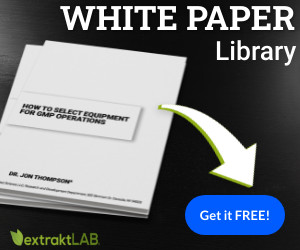
Full vs. Broad Spectrum and Isolate
Product formulations are a critical part of the CBD extraction process, but sometimes it can get complicated. What is full spectrum distillate? How is it any different from broad spectrum distillate? And what about CBD isolate? All of these formulations have their place in the CBD industry and it is important to know what product is the best for each individual in order to create a profitable extraction business.
Depending on the individual user, full spectrum, broad spectrum or CBD isolate can have different effects, and may affect that user’s preference when choosing a product.
Where full spectrum may be considered the best option for someone looking to take advantage of The entourage effect with terpenes and a full range of cannabinoids working together to create compounded effects, CBD isolate may be the best choice for someone looking for the lone benefits of just cannabidiol.
Lying somewhere in the middle lies broad spectrum which may contain specific cannabinoids and terpenes without THC in any quantity.
All of these formulations are beneficial to some, and detrimental to others making it important to distinguish each in your own production. In this episode of extrakTALKS, Dr. Jon go into full detail about these topics including how to formulate, the legality, and the personal risks and benefits of each.
Listen up and learn how to implement these formulations to your own extraction business and see just how vital full, broad and isolate formulations are in the CBD market.
To learn more, visit our website:
https://extraktlab.com/supercritical-co2-extractors/
We have tons of useful information in our No Holds Barred playlist https://www.youtube.com/playlist?list=PLQX9clbTgskpmjbiHCtAY9Y_zti3hvrtH
Are you stuck in your business, need a solution? Schedule a free CBD Jam Session to get you the solution you need:
https://extraktlab.com/cbdjamsession/
Visit our blog for other important resources at https://extraktlab.com/blog/ or you may listen to our podcast here https://extraktlab.com/podcast/.
Download our Distillation Guide to learn the ins and outs of all things distillation:
https://extraktlab.com/wiped-film-distillation-guide/
Watch as Dr. Jon gives a Live Tour of 5 Ton/Day Processing Facility:
https://extraktlab.com/live-tour
Here is a link to a FREE Advanced guide to extraction:
https://extraktlab.com/advanced-extraction-guide/
[05:07] – Primer Full Spectrum, Broad Spectrum , Isolate
[06:50] – Brands of United Science
[07:28] – Bulk Products from Hemp
[10:05] – Progression of products
[11:13] – Close up of Hemp Flower
[12:26] – Biomass Composition
[13:07] – Hemp and Marijuana Processing
[13:45] – Crude Oil
[14:58] – Soupy Collection of Crude Oil
[16:02] – Crude Composition
[17:54] – Distillate
[18:59] – Distillate Composition
[20:04] – Isolate
[20:49] – Isolate Composition
[22:14] – Broad Spectrum
[22:22] – Broad Spectrum Composition
[23:19] – Full Spectrum Vs Broad Spectrum, Vs Engineered Spectrum
[26:54] – In Full Spectrum THC Non-Spec What is the Average Percentage?
[27:44] – Example of an Engineered Spectrum?
[32:15] – Pros and Cons for Bulk Products
[35:14] – Taste Testing Different Products
[42:03] – Growing Population of CBD Users
[47:18] – Formulations
[47:40] – What is the Entourage Effect?
[48:47] – Pharmacodynamics
[57:36] – Terpenes and Cannabinoids That Work Synergistically
[58:33] – Main Terpenes Found
[01:00:20] – Dr. Jon’s Entourage Effect Comparison
[01:06:31] – Final Words
Coming Soon
Stay up to date on our latest releases
extrakTalks Playlists
Hemp Business
Extraction
Formulations
Most Recent
Some Additional Information on Broad vs Full Spectrum & Isolate
The Difference Between Full Spectrum and Broad Spectrum CBD
While CBD is incredibly popular for a wide variety of users, not all formulations are the same. Full spectrum and broad spectrum CBD formulations make a difference in their effectiveness. Because cannabinoids like delta-9 THC are very strictly controlled, broad and full spectrum extracts find their own place in both the hemp and cannabis markets.
Where one person may find numerous benefits from a full spectrum product containing delta-9 THC, others may find it off putting either for dislike of psychoactive substances, legal ramifications or because of their chosen field of work. For this reason, various formulations of CBD extracts are crucial in providing a high quality product to a variety of consumers interested in the various benefits.
In order to fully understand these CBD formulations, we will give a detailed look at full spectrum vs broad spectrum CBD below including how it is created, what differentiates them, the benefits of each and how to choose the right product for you. We will also compare these two products to isolate CBD and the role it plays in the hemp extraction market next to full and broad spectrum.
What is Full Spectrum CBD?
Full spectrum CBD, as the name implies, contains a full spectrum of cannabinoids and plant compounds in the final extract. These formulations contain all of the common cannabis plant components, cannabinoids as provided by the plant – including THC – and a full spectrum of terpenes. For CBD products, the THC is limited where it is not medically or recreationally legal. Federal regulations only allow a percentage less than 0.3 percent of THC to be allowed in a final CBD product in these circumstances.
There are a number of benefits to full spectrum formulations that are proposed. By having all of the plant’s natural compounds in an extract, they are capable of working in conjunction with each other which potentially creates enhanced effects rather than working singularly. This potential synergistic effect is often referred to as “The Entourage Effect” which we will touch in detail later.
Calculate Your Extraction Business Operating Cost
Starting a Extraction Business? Check out our Calculators and to analyse costs, estimated revenue, yield, initial investments and important metrics for your extraction business.
What is Broad Spectrum CBD?
These formulations contain CBD and a full spectrum of terpenes but not THC. However, they are not considered “THC-free” but are instead considered to be “THC non-detect” with the analytical method of choice. For example, THC isn’t detectable at 300 nm. Minor cannabinoids may or may not be present in broad spectrum oils depending on the plant.
While similar to a full spectrum formulation, the lack of THC is what differentiates broad and full spectrum formulations. This allows for a wide variety of benefits that come with a large number of naturally occurring cannabinoids in the hemp plant other than CBD including CBG, CBN, and others. Because of the removal of delta 9 THC, the only remaining cannabinoids are non-psychoactive making the formulation incredibly safe legally and psychologically for the end user.

What is Isolate?
CBD isolate is a highly refined formulation of CBD and therefore does not have any detectable levels of Delta-9 THC or any other cannabinoids present in the final product. However, the language for CBD isolate products has shifted from the previous “THC-Free” label because it is not guaranteed that there would be an absolute remediation of Delta 9 THC in the product. To avoid litigation and false claims, THC Non-Detect is the preferred language as it does not imply zero THC, but instead indicates that the level of THC is not in a high enough level that can be detected by testing equipment.
The same can be said of the other cannabinoids that are extracted from the hemp plant. While full and broad spectrum extracts contain a number of other cannabinoids apart from CBD, isolate formulations intentionally “isolate” CBD so that it is the only detectable cannabinoid present in the final product. This makes both potency and purity absolute and allows for very specific tailored formulations by using a chemically pure product as opposed to a product that may have plant terpenes, minor cannabinoids and other plant compounds present in the extract.
How are Full Spectrum and Broad Spectrum Extracted?
Though different in their formulations, the extraction process of both full and broad spectrum extracts is relatively the same. The extraction process itself is the same in both cases from start to finish.
The flower of the hemp plant is bucked and ground to a fine consistency before being added to an extraction column. From there a solvent is added to the ground flower inside of the column in order to strip the desired cannabinoids and other plant compounds from the plant. This solvent is often in the form of hydrocarbons like butane, ethanol or supercritical CO2. These solvent are pressurized and brought to specific temperatures in order to efficiently extract the cannabinoids, terpenes, fats, waxes and other compounds from the plant leaving the biomass behind.
After the extraction of these compounds, a crude oil is collected and leaves behind the original flower from the hemp plant. This oil is not yet a finished product that can be used by a consumer. Further filtration, solvent removal, distillation and THC remediation are necessary before this extract can be formulated into a full, broad, or isolate CBD product. Each of these processes are essential to create a useable product
Filtration:
This process is very important to remove plant fats and waxes – particularly from supercritical CO2 extraction. This involves combining the crude oil with food grade ethanol and dropping the temperature to sub-zero levels. This solidifies the fats and waxes that were co-extracted from the hemp plant while the cannabinoids and terpenes remain in the ethanol mixture. Once the full winterization process is completed, the mixture is filtered through a vacuum filtration mechanism that leaves behind the fats and waxes effectively removing them from the product.
Make your own bulk CBD Isolate!
Starting a Extraction Business? Check out our Calculators and to analyse costs, estimated revenue, yield, initial investments and important metrics for your extraction business.
Solvent Removal:
This process is exactly as the name suggests. No matter the method of extraction, there will always be remaining levels of the solvent used to extract the cannabinoids and terpenes from the biomass left in the oil. In order to do this, heat, vacuum pressure and thin film equipment are implemented in order to evaporate the remaining solvent from the desired compounds. By applying the oil inside of a vacuum, the necessary temperature to volatilize the solvent from the extracted oil is lowered. This allows for the evaporation of the solvent without damaging the valuable cannabinoids and terpenes contained in the leftover oil. To increase the efficiency of this process, a piece of equipment like a rotary evaporator or falling film evaporator spreads the mixture out thin making it easier for the solvent to be removed from the desired oil.
Distillation:
As the solvent is increasingly removed from the extract, it will continue to become more viscous making it more difficult to spread the mixture thin to remove the final quantities of solvent from the final distillate. While the same principles apply from solvent removal to distillation, a mechanical means of thin film application is used through equipment like a wiped film distillation equipment. This uses a wiper to spread the oil thin across a heated surface that allows for the removal of trace amounts of solvent from the distillate. This creates a final product that can be formulated to create a full spectrum product, though dilution would be necessary to ensure legal levels of delta 9 THC if the product is being sold in states where it is not legal.
Remediation:
For products like broad spectrum and isolate, the remediation of all detectable levels of delta 9 THC is necessary to ensure an honest and legal product. Among the best way to perform this is through chromatography. High Performance Liquid Chromatography effectively separates the various components of an extract into their separate forms. This allows the processor to separate out the delta 9 THC from the extract and remove it to create a product with non-detectable levels of THC when necessary. To create a broad spectrum formulation, this is an essential process for legal reasons, and for those looking to consume a CBD product without ingesting a psychoactive cannabinoid like delta 9 THC.
What is the Entourage Effect?
Due to the numerous reported health benefits of naturally derived plant terpenes, recent studies have addressed the therapeutic benefits of terpenes. One interesting study recently conducted points to the synergistic effect of cannabinoids and terpenes called The Entourage Effect.
Perhaps the most interesting facet of terpene study in the hemp and cannabis industry is seen in what is commonly referred to as “The Entourage Effect.” The Entourage Effect is a study monitoring the activity of cannabinoid receptors in the brain when isolated cannabinoids were consumed compared to cannabinoids combined with terpenes.
This fascinating study has revealed that terpenes may play a significant role in the effects of hemp and cannabis products when used in conjunction with cannabinoids and other cannabis derived compounds. When terpenes were introduced, the activity of those receptors increased, suggesting that cannabis derived terpenes could potentially enhance the medical benefits of cannabinoids.
Though they are most notable for creating scent and flavor, terpenes themselves have also been studied to have physical and mental effects on their own. Looking back to limonene as an example, studies have shown this terpene to have mood altering effects and/or stress relieving effects and may even be useful for antifungal and antibacterial uses.
When used directly with the effects of cannabinoids, however, studies have shown that the use of terpenes and cannabinoids together enhances the efficacy of each as opposed to using them separately. For this reason, terpenes have become increasingly sought after in hemp and cannabis product formulations.
In other words, these studies show that the benefits of certain cannabinoids on their own are less than that of a compound that contains a full range of cannabinoids and terpenes. This ongoing study provides further evidence of the value that terpenes have in a final cannabis concentrate product, and how important it is to collect pure, unadulterated terpenes.
Choosing the Right Spectrum: Broad Spectrum vs Full spectrum
Choosing between full spectrum vs broad spectrum CBD can depend on a variety of factors. In terms of legality, THC can be outright illegal in any capacity making isolate and broad spectrum formulations the ideal choice. For those where THC is not an issue, getting the benefits of using a full spectrum formulated product makes sense as the entourage effect can be taken advantage of without fear of legal repercussions.
On a personal level, there may be those who are apprehensive about using THC simply for the fact that it is a psychoactive substance and they may wish to avoid even the possibility of feeling altered after ingesting a full spectrum product. In this case, a broad spectrum product may be best.
This also may apply to a job or other situation in which a full spectrum product could potentially lead to a false positive on a drug screening. If neither of these issues are of concern to the individual, then it may be the ideal choice to use a full spectrum product when levels of delta 9 THC is not an issue.




